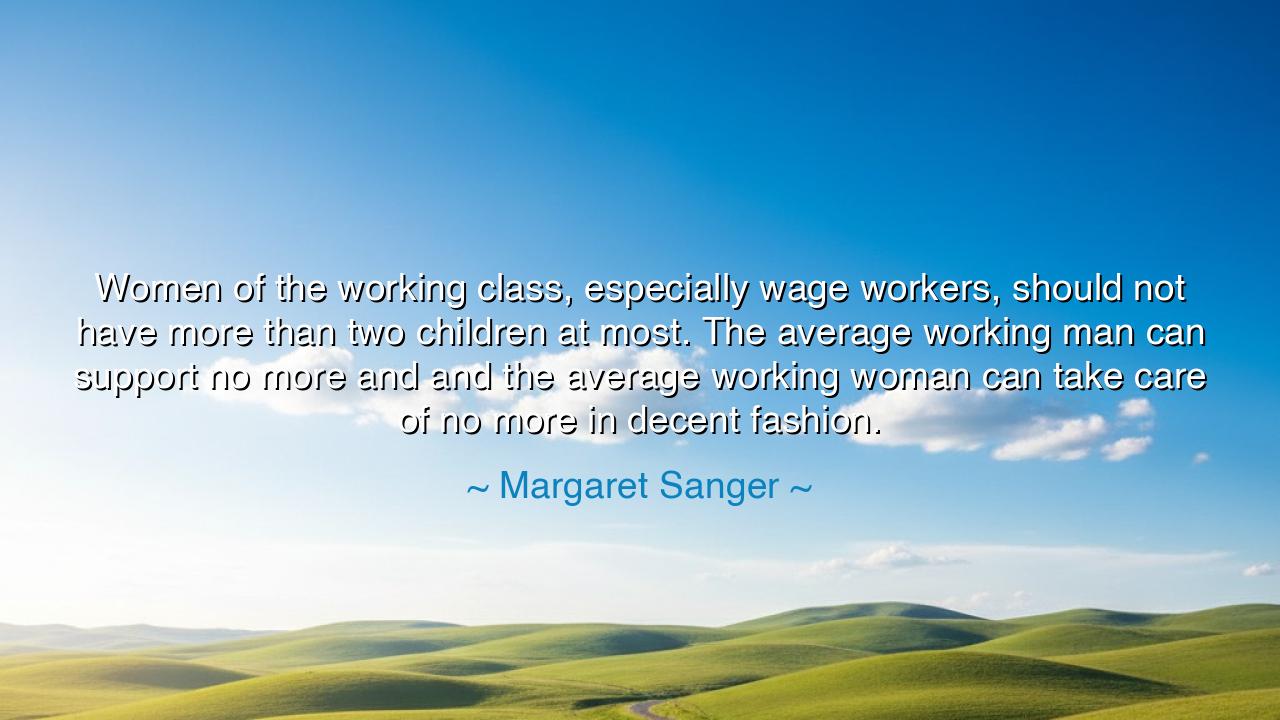
Women of the working class, especially wage workers, should not
Women of the working class, especially wage workers, should not have more than two children at most. The average working man can support no more and and the average working woman can take care of no more in decent fashion.






Hear, O children of burden and choice, the commanding words of Margaret Sanger: “Women of the working class, especially wage workers, should not have more than two children at most. The average working man can support no more and the average working woman can take care of no more in decent fashion.” In this saying, she speaks not of disdain for life, but of compassion for its weight. For Sanger, the chains of poverty were heavy, and she saw how they crushed families when too many mouths hungered and too few hands could provide.
For the working class was bound by long hours, low wages, and little relief. Women, burdened by endless childbirth, often saw their health broken, their strength drained, and their children raised in deprivation. Sanger, who witnessed this suffering as a nurse, proclaimed that dignity demanded limitation, that a family should not be a prison of want but a circle where each life might flourish. Thus, she tied the dream of freedom to the power of women choosing when and how to bear children.
History bears witness to this struggle. In the crowded tenements of New York City at the dawn of the twentieth century, poor immigrant women bore child after child, many lost to sickness, while fathers labored for pennies. Sanger saw these tragedies firsthand, and from them was born the movement for birth control. Her words were not meant to scorn life, but to defend its quality—to insist that children deserve not only existence, but care, nourishment, and hope.
And yet, her teaching carried controversy. Critics accused her of coldness, of denying the sanctity of motherhood. But Sanger’s intent was not to deny motherhood, but to exalt it: to say that motherhood, freely chosen, is holy, while motherhood forced by poverty is a cruelty. Her cry was for decency, that each child born to the poor might be clothed, fed, and cherished, rather than lost to misery.
Therefore, O seekers of wisdom, let this be your lesson: compassion is not only in giving life, but in ensuring that life may be lived with dignity. The cry of Sanger is that freedom and responsibility must walk together, and that the poor should not be condemned to suffering by the blind weight of tradition. For the measure of a society is not how many are born, but how well it cares for those who breathe.






NTNguyen Thuong
Sanger’s perspective on family size is rooted in her social advocacy, but it seems to oversimplify the complexities of personal and family life. Can the number of children a woman has really be reduced to economic capacity alone? Are there ways to empower women to make family choices without imposing limitations based on class or gender? I think this idea risks reducing women to mere economic units rather than respecting their autonomy and personal circumstances.
CTko cs ten
While I understand Margaret Sanger's concern for the challenges that come with raising children in working-class families, her suggestion that women should limit their families to two children feels very prescriptive. What about women who might want larger families despite financial constraints? Isn't the essence of reproductive rights the ability for women to make these decisions for themselves, regardless of their economic situation? Where do we draw the line between societal pressure and personal freedom?
DDChu Duc Dung
Margaret Sanger’s argument, though rooted in concern for economic stability, raises difficult questions about gender roles and family planning. Her idea that women, particularly wage workers, should limit their families to two children feels restrictive. It makes me question whether her view implies a one-size-fits-all solution, or if she was truly considering the diversity of women’s experiences and desires in different socio-economic situations. Can we ever truly balance personal choice with economic reality in such matters?
HDTrinh Hoai Duc
Sanger’s view seems to reduce the complexity of family life to a simple economic calculation. But is it fair to suggest that working-class women should limit their families based on what the average working man can support? How much of this perspective was shaped by class prejudice, and how might it conflict with the values of personal freedom and family choice? This quote certainly sparks a debate about the balance between economic realities and reproductive rights.
HHa
Margaret Sanger's statement is quite controversial, especially when considering the historical context of her advocacy for birth control. While her concern for the well-being of working-class families is evident, does this suggestion ignore the personal autonomy of women? Shouldn't individuals, regardless of class, have the freedom to decide how many children they wish to have? It raises the issue of who decides what is 'decent' and whether such ideas can be seen as patronizing.